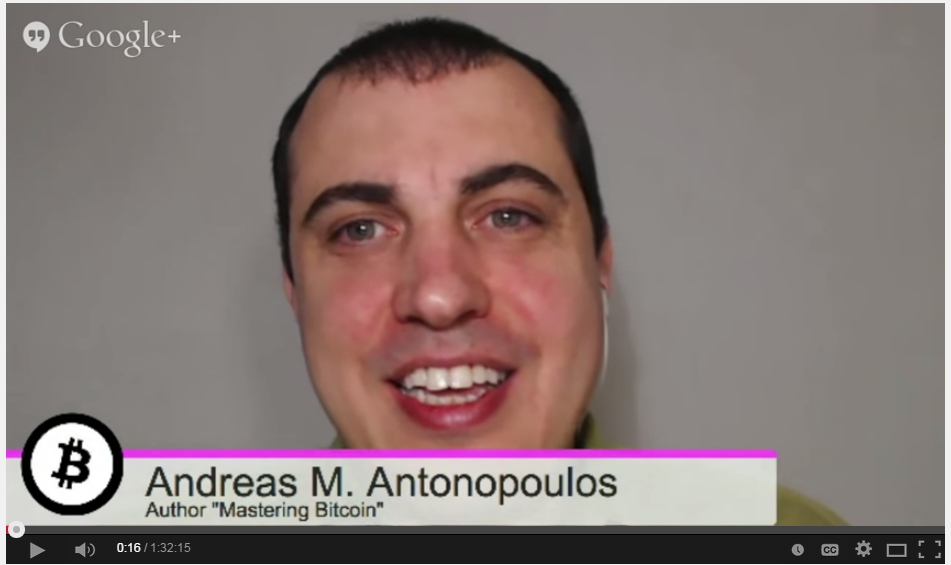By 6:00 pm on Wednesday night, a small crowd had begun to gather on the front steps of 64 Spadina, as excitement built in anticipation of Andreas Antonopoulos’s Skype address. By the time the highly-respected bitcoin guru and advocate began speaking, the crowd had filled every one of the 40+ chairs and taken over most of the standing room along the perimeter. Another 80+ watched the feed online.
Host and moderator, Anthony Di Iorio, encouraged general participation in the Q&A, in keeping with the decentralized theme of the evening. He initiated the discussion by asking Antonopoulos about his recent address to the Canadian Senate Committee on Business, Trade and Commerce and how he prepared for the event.
Antonopoulos said that the Senate approached him to speak in the same way that anyone else would: through a link on his website that fields requests for speaking engagements. So he looked into the previous senate hearings on the topic, and was encouraged to see that they seemed to have a fairly “open-minded” attitude. Then, in true grassroots style, Antonopoulos took to social media to ask the Canadian bitcoin community if they thought he ought to go. “The overwhelming respsonse was yes!” he said.
<img src=”http://decentral.ca/content/images/2014/11/Andreas-2.PNG” width=”500″ />
As for preparation, Antonopoulos pointed out that his years of doing meet-ups and Q&As in front of community groups, bankers, developers, and newcomers to the bitcoin space had served as “continuous preparation” for addressing the Senate. None of their questions were surprising — he’d heard them all before.
As for follow-up from the event, he laughed about having to submit his expenses by fax (!) and then having to wait for someone in Ottawa to send him a paper cheque via snail mail so that he could deposit it in “an esteemed banking institution” where it would languish for 3-5 business days — thus poetically demonstrating the superiority of bitcoin as a payment system.
However, Antonopoulos later reminded the audience that because of infrastructure limitations, bitcoin isn’t ready to serve everyone around the world. This is especially true of developing countries where the disenfranchisement of the unbanked is most keenly felt. In order for a community to participate fully, it needs a decent infrastructure, as well as a certain level of economic and financial literacy. In turn, bitcoin technology itself needs to become less technologically complicated, perhaps following the mPesa model.
Antonopoulos described the way forward for bitcoin adoption as a continuous feedback loop. “We need to downtech bitcoin at the same time as these [developing] communities uptech.”
While Antonopoulos is now known as the fellow who “wrote the book on Bitcoin,” (literally — Mastering Bitcoin will be in stores in January 2015), his focus for the future seems to be shifting to accessibility and promoting educational opportunities around digital currencies. He spoke of the need to integrate cryptocurrency technology and coding into post-secondary and advanced degree programmes — even into high school curriculae. Some of his future projects might include working with the boards of educational organizations and curriculum developers. He was excited about the work of C4 — the CryptoCurrency Certification Consortium with its mandate to provide guided education and continuous learning for aspiring cryptocurrency professionals. A repeated motif throughout the evening focussed on the importance of “investing in skills to develop for the future.”
“The most important investment you can make in digital currencies and decentralized currencies…is a skills investment, and that investment will generate a significant return on investment for many years to come.”
He added that “any time spent on developing skills is an investment” since no matter what turns the technology takes down the road, those skills will be universally applicable.
When asked earlier about the lack of developers in the space, Antonopoulos had stressed that those who develop these skills, especially new tech developers and engineers, will find themselves in high demand as start-up companies expand, creating more and more job growth opportunities.
The event concluded on a high note of optimism which continued in various conversations among meet-up guests who mingled and networked late into the evening.
If you want to attend one of Decentral’s future meet-up dates, please be sure to join the Bitcoin Decentral Meet-up group and reserve your spot, due to their increasing popularity.

 Made in Canada
Made in Canada